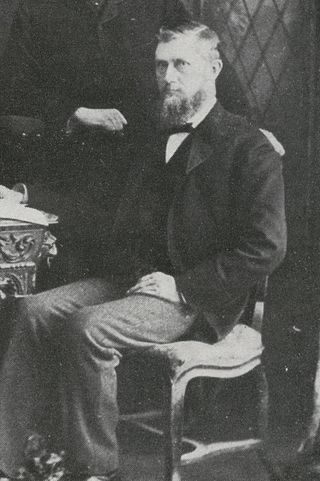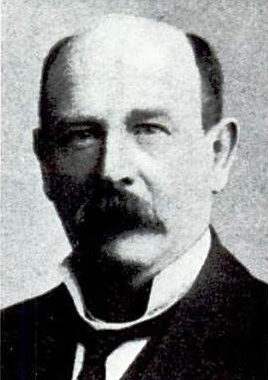Related Research Articles

Cecil John Rhodes was a British mining magnate and politician in southern Africa who served as Prime Minister of the Cape Colony from 1890 to 1896.

John Xavier Merriman was the last prime minister of the Cape Colony before the formation of the Union of South Africa in 1910.

Sir Herbert Baker was an English architect remembered as the dominant force in South African architecture for two decades, and a major designer of some of New Delhi's most notable government structures. He was born and died at Owletts in Cobham, Kent.

Grahamstown is a town of about 140,000 people in the Eastern Cape province of South Africa. It is situated about 110 kilometres (70 mi) northeast of Port Elizabeth and 130 kilometres (80 mi) southwest of East London. It is the largest town in the Makana Local Municipality, and the seat of the municipal council. It also hosts Rhodes University, the Eastern Cape Division of the High Court, the South African Library for the Blind (SALB), a diocese of the Anglican Church of Southern Africa, and 6 South African Infantry Battalion. Furthermore, located approximately 3 km south-east of the town lies the world renowned Waterloo Farm, the only estuarine fossil site in the world from 360 million years ago with exceptional soft-tissue preservation.

St. Andrew's College is an Anglican high school for boys located in Makhanda (Grahamstown), Eastern Cape province of South Africa. It was founded in 1855 by the Right Reverend John Armstrong, the first Bishop of Grahamstown. It is a semi boarding school, with a number of day boys. St. Andrew's College caters to 480 pupils from around the globe. The school is also a member of the G30 Schools group and closely associated with its brother school, St. Andrew's Preparatory School, and its sister school the Diocesan School for Girls.

François Stephanus Malan PC, usually called F. S. Malan or just F. S., was a South African politician.

Sir John Gordon Sprigg, was an English-born colonial administrator, politician and four-time prime minister of the Cape Colony.

Sir Thomas Charles Scanlen was a politician and administrator of the Cape Colony.

Sir James Molteno, was an influential barrister and parliamentarian of South Africa.
The Afrikaner Bond was founded as an anti-imperialist political party in 19th century southern Africa. While its origins were largely in the Orange Free State, it came to have a significant presence across the region, and especially in the Cape Colony and the Transvaal.
John Charles Herries Brooke was Dean of Cape Town from 1932 to 1947.

Jacobus Wilhelmus ("J.W.") Sauer, was a prominent liberal politician of the Cape Colony. He served as Minister in multiple Cape governments, and was influential in several unsuccessful attempts to enshrine equal political rights for black South Africans in the constitution of the Union of South Africa. He was also a strong early supporter of women's rights and suffrage.

John Charles Molteno Jr. M.L.A., was a South African exporter and Member of Parliament.

Sir George Edward Cory, was an English-born South African chemist and historian, best known for his six-volume publication "The Rise of South Africa".

The Parliament of the Cape of Good Hope functioned as the legislature of the Cape Colony, from its founding in 1853, until the creation of the Union of South Africa in 1910, when it was dissolved and the Parliament of South Africa was established. It consisted of the House of Assembly and the legislative council.

Sir James Rose Innes was the Chief Justice of South Africa from 1914 to 1927 and, in the view of many, its greatest ever judge. Before becoming a judge he was a member of the Cape Parliament, the Cape Colony's Attorney-General, and a prominent critic of Cecil John Rhodes. His maternal grandson was Helmuth James Graf von Moltke, a prominent opponent of the Third Reich.

Charles William Hutton MLC was a Member of the Cape Legislative Council and the country's Treasurer General during the Government of Prime Minister Thomas Scanlen.

John Blades "JB" Currey (1829–1904) was Colonial Secretary to the Government of Griqualand West and an influential businessman and politician of the Cape Colony.
Arthur Matthews was a founding professor at Rhodes University in Grahamstown, South Africa.
The Right Honourable Henry Burton, KC, PC was a South African lawyer and politician.
References
- Currey, John Blades (1986). Phillida Brooke Simons (ed.). John Blades Currey, 1850 to 1900: Fifty Years in the Cape Colony. Brenthurst Press. ISBN 0-909079-31-5.